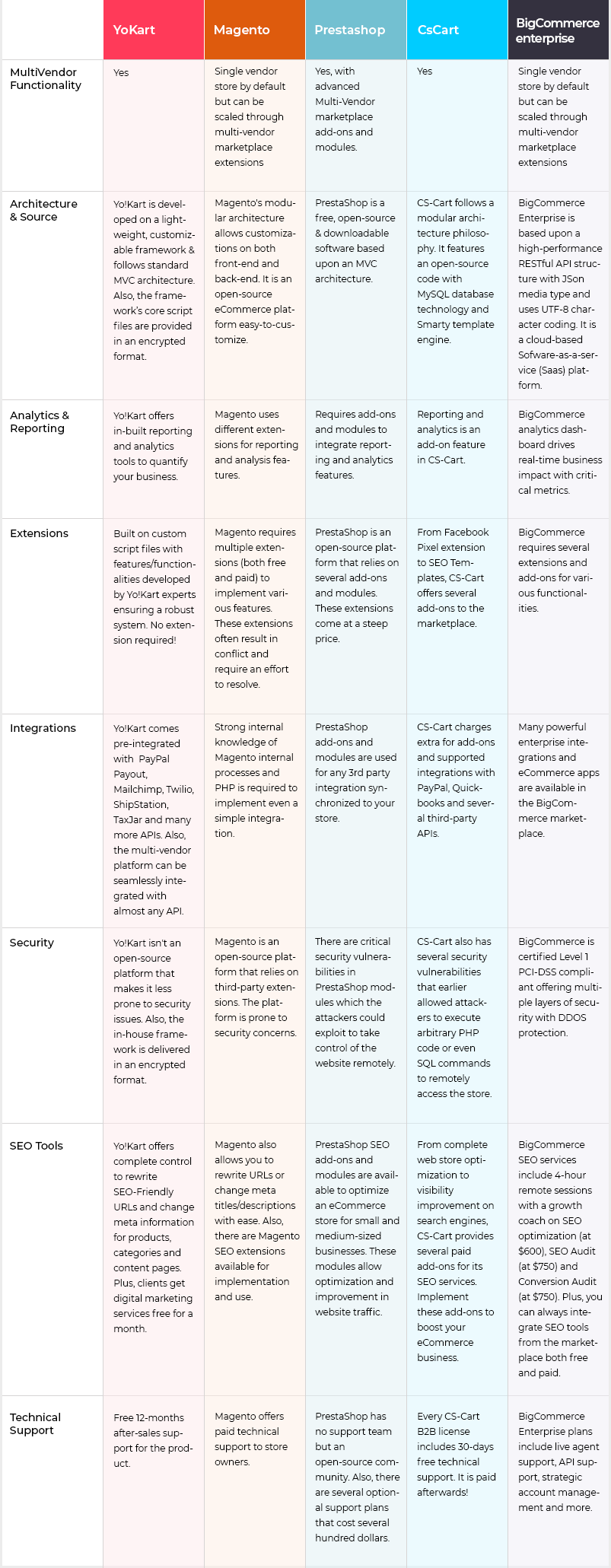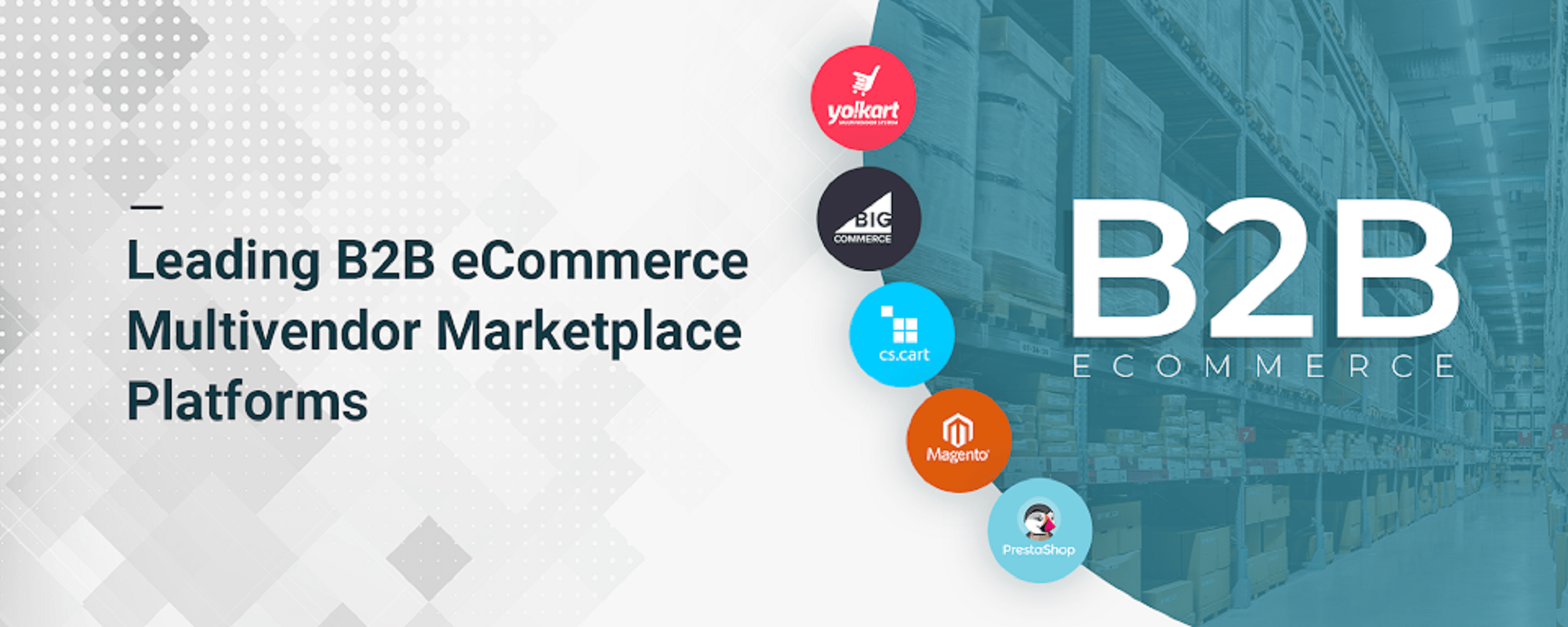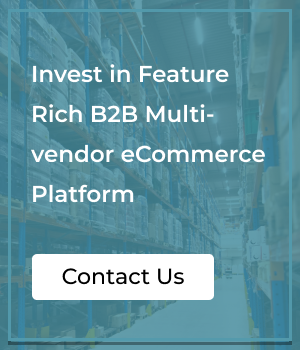Last Updated: 08th February, 2024
Sellers in the B2B domain are increasingly turning to B2B eCommerce platforms to conduct their business activities. According to research, the B2B eCommerce market in the US is expected to reach USD 8,573 billion by 2030, accounting for a CAGR of 21.6%.
Globally, B2B eCommerce is gaining steam and the significant driver of this growth is Amazon Business which is a B2B marketplace platform by Amazon. Among all B2B platforms, it has maximum traction with small and medium enterprises. Moreover, according to Statista, its gross merchandise volume is projected to reach USD 83.1 billion by the year 2025.
According to Gartner, about 80% of B2B sales interactions will take place through B2B eCommerce platform channels by the year 2025. This figure has seen a huge jump from the year 2021. The key factor driving this upsurge is customer demand. Moreover, online sales now drive about a fifth of all revenue for an average B2B company. This figure equals in-person sales for these businesses and exceeds all other channels. As retail giants like Amazon business surge ahead, B2B sellers are realizing the importance of an online marketplace to keep up with the competitors.
While these numbers indicate a rising opportunity to start with your B2B eCommerce platform, you might be wondering what is the best way to do so. The answer is easier than you might be aware of. The industry has some very capable B2B eCommerce software available. In this blog, let’s discuss the most favored options amongst such software.
Table Of Contents:
What is a B2B Multi-vendor eCommerce Marketplace?
Like Amazon business, a B2B (Business-to-Business) eCommerce marketplace typically has sellers (including brands, manufacturers, wholesalers, and suppliers) selling products in bulk to other businesses (buyers).
Both sellers and buyers in a B2B marketplace platform are businesses where payments are usually carried out digitally on the eCommerce platform.
Essential Features of a B2B multivendor marketplace
Features from an Admin Perspective
-
Complete Admin Control
Decisive Admin control on the marketplace will help in regulating operations on the platform, ensuring brand consistency. It helps the business to project coherence and predictability.
-
Platform Product Management Features
The capability to provide well-detailed product information allows the buyers to gauge the products in a digital environment. Furthermore, controlling variables related to product management like reviews, allows the admin to navigate nefarious activities and inconsistencies on the platform.
-
Support for Multiple revenues streams
A marketplace or a multi-sellers business opens up multiple avenues for revenue generation. Typically, the business can earn via charging commissions on sales taking place on the platform, levy subscription plans in lieu of better services, monetize website assets for sellers’ adverts, run PPC campaigns, and a lot more. The support for these revenue streams will open up multiple opportunities for the marketplace business and render flexibility.
-
Multilingual & Multi-Currency
Marketplaces, especially in the B2B domain tend to scale both voluminously and geographically. Adding Multilingual and Multicurrency capabilities allows online businesses to expand their reach and scope.
-
Multiple Payment Methods and secure payment gateways
Allow buyers to transact on the platform in their preferred payment modes and open up opportunities for higher conversions. Furthermore, including popular, fast-performing, and secure payment gateways ensure buyer confidence in the platform.
-
Streamlined Shipping Management
Better shipping and fulfilment features allow the admin to streamline the delivery process. Furthermore, with a streamlined process and availability of shipping options, sellers can ensure efficiency and evaluate the best-suited strategy by factoring in cost and logistic variables.
-
Tax Management
To navigate varying tax slabs, for instance varying tax laws in various states of the US, Tax management will be an essential eCommerce feature. It allows the admin to automate levying taxes subject to varying specific state laws. This further reduces manual involvement, reduces errors, and automates a repetitive process.
-
Inventory Management
Sellers need to manage their sales stocks effectively. Inventory management streamlines stock-keeping with low stock alerts and other features. With this module, sellers can maintain optimum stock levels and avoid missed sales due to understocking or excess working capital investment due to overstocking.
Features from Sellers’ Perspective
-
Request For Quote Module
A B2B interaction differs from those in the B2C domain. Sellers have a multi-prong strategy toward their product prices. Typical considerations may include branding requirements, stock levels, market demand, order volume, buyer relations, and many others. Hence, RFQ gives sellers the necessary flexibility and allows them to stay open for negotiations.
-
Bulk Price Discounts & Minimum Order Discounts
B2B often involves bulk purchases. The capability to offer bulk discounts and setting MOQ encourages buyers to purchase more and in bulk – allowing sellers to set up operations like packaging, logistics, and pricing strategy accordingly.
-
Offering Part payments to buyers
In B2B, transactions can often be of high value. Also, due to this, the order might take up time. In fact, the order might not close with a single shipment dispatch. Due to these factors, offering a part payments option will help sellers to close more orders on the B2B eCommerce platform.
-
Real-Time Inventory Updates
Allow sellers to track the current stock level and list products accordingly, reducing instances of shortages or overstocking.
-
Separate Vendor Store
Separate storefront allows the vendor to set up a virtual storefront within the marketplace. This helps in their branding and allows buyers to find all products listed by sellers under a single point.
Build Feature Rich B2B Multivendor Marketplace
-
Introduction – Yokart B2B is a self-hosted multi-vendor solution that lets startups or existing businesses build a contemporary online marketplace. YoKart B2B is the B2B-specific software by the same team that has developed the leading B2C multivendor turnkey solution – YoKart.The turnkey solution is customizable and scalable, making it equally suitable for SMBs as well as large enterprises. YoKart B2B has been developed from the ground up, perfected, and backed by Agile teams for customizations and support. This has resulted in a secure, robust, and reliable solution. Team YoKart has taken the same trusted underpinnings used for a Fortune 500 brewing company, UNI Diamonds – Israel’s biggest B2B diamond distributor, and many other steller B2B eCommerce platforms.
-
Features – YoKart B2B marketplace software has been purpose-built to offer domain-specific features and more. The following features, integral to B2B success – come out of the box in the turnkey solution:
- YoKart B2B has an in-built RFQ module that is usually offered at an additional cost by other B2B solutions. It lets buyers place a quote for products listed on the website. The sellers can accept, reject, or present a counteroffer. The control for the RFQ module is with the sellers and the admin of the marketplace.
- The marketplace solution offers manufacturers, distributors, and other sellers intuitive B2B features. It has functionalities like personalized vendor storefronts, automated shipping management, offering part-payments, setting minimum order quantity for products on sale, bulk ordering with the option of adding bulk discounts, and more.
- YoKart B2B also allows the sale of services with products, either bundled or exclusively. This further broadens the scope of the marketplace.
- The intuitive solution has been built to offer satisfying end-user experiences. The most notable features include multicart checkout, one-click re-order, multiple payment gateways pre-integrated, cart abandonment recovery solution, easy registration and social login, multilingual and multi-currency functionality, supplier search, the ability to add reviews, and much more.
- The marketplace owners can run successful businesses underpinned by features like PWA compliance, ease of business operations with pre-integrated business APIs, the option to hide prices at admin and seller level, measuring business health with detailed reporting and analytics, multiple revenue streams including subscription fee, commission fee, PPC, and more.
-
Pricing – The prices of the B2B-specific version of the multi-vendor platform start from $1499. Customizations can be availed with the support of an Agile team. Charges for the customizations are over and above the package. With every YoKart B2B package, you receive lifetime ownership with free installation and no recurring fees.
-
Software reviews and ratings – With no additional hidden costs such as on platforms like WordPress, Prestashop, WooCommerce, Joomla, and others, YoKart B2B offers Agile technical support, which is very important during the initial phase of business. But, given its comprehensive nature, first-time users’ only concern is that they need to invest time to learn the system.
Similar B2B eCommerce solutions by FATbit Technologies:
Yo!Rent – B2B Rental eCommerce Platform
Yo!Rent is a rental eCommerce software that helps entrepreneurs to launch their B2B marketplaces with rental functionalities. This online rental software is a fully customizable, white–label and self-hosted solution available at a one-time cost.
Features:
- In-built RFQ module for orders in high volume
- Bulk volume discount, depending on the order volume
- The software comes with features such as a late return module, rental security management, order cancellation, and various other features that make it an excellent B2B rental platform
Yo!Coach – Online Course Marketplace Software
Yo!Coach Plus is a bespoke online course marketplace software that is designed for entrepreneurs to launch their course-based platform with ease. It incorporates advanced features like progress tracking, dynamic search filters, resource management, automated refund and cancellation, and so on. Blended with user-centered technology, Yo!Coach Plus is ideal for tutors and subject experts to upload and sell (pre-recorded) course-based videos. In addition, tutors can also conduct one-to-one sessions and group sessions in real-time.
Features:
- Facility to provide certificates to learners for their skill authentication
- Addition of pre-recorded course-based videos for selling
- Offers notes to keep condensed records for future revision
- User-friendly, offers multicurrency and multilingual support
CS-Cart
-
Introduction – Founded in 2005 in the US, CS-Cart is a reliable multi-vendor software for marketplaces. The eCommerce software is suitable for enterprises with complex requirements. It offers a customizable storefront, advanced admin panel, and integrations with major shipping and payment services. While it is a B2C software out of the box, paid B2B features can be added to the solution.
-
Features – The top features of CS-Cart include real-time shipping rate estimation, tax management, CRM, multi-store management, and more. With CS-Cart one has the ability to manage the newsletter and send mass notifications with ease.
-
Pricing – While, the CS-Cart B2C package incurs recurring charges ranging from $1250 – $6950 per year, the B2B-specifc solution is Request For Quote. There’s 1 month of free technical support with B2B package.
-
Software Reviews and Ratings – Hassle-free accounting and the ability to create your own promotions. But any tweaks done to the marketplace are lost during upgrades switching it to default. Also, users often complain about the failed update system, bad internal policies, and poor customer support (only available during GMT+4 business hours). CS-Cart has a rating of 4.7 on Capterra.
BigCommerce Enterprise
-
Introduction – BigCommerce is a flexible, open Saas-based platform to launch your eCommerce business with ease. Founded in 2009, BigCommerce enables you to launch a B2B eCommerce store that is easy to customize. The modernized platform allows you to build sleek site designs with customers and price segmentation. Plus, you can easily integrate existing business tools with one-click integration.
-
Features – BigCommerce has several key features for a successful eCommerce marketplace. Its most notable features include customizable design themes, abandoned cart savers, pre-integrated payment options, professional SEO tools, and more. It is a highly valuable platform for an online marketplace setup.
-
Pricing – BigCommerce is a subscription-based platform with a starting price of $29.95/month. Its Plus plan costs $79.95/month and the Pro plan comes at $249.95/month. Also, it offers a free trial to users. For pricing information on its enterprise plan, contact the BigCommerce team.
-
Software Reviews and Ratings – A useful platform to launch your eCommerce store. But, the most frequent complaint from users is that the support sometimes has no idea about the ongoing issue which is a bit frustrating. Also, the themes are pretty similar and there’s a limit on yearly sales forcing you to upgrade. BigCommerce has a rating of 4.3 on Capterra.
Magento
-
Introduction – Open source multi-seller eCommerce platform founded nearly 12 years ago in 2008, Magento is designed for both small-scale and large organizations in the retail industry. It allows you to edit, create, and manage eCommerce websites offering a personalized consumer experience. The platform is easy-to-customize and allows seamless third-party integrations.
-
Features – Magento offers features like custom coupon creation, SEO management, product review promotion, multiple payments and shipping options, and more. The platform is PCI-DSS compliant.
-
Pricing – While Magento’s open-source version is free-to-download, the starting price for Magento Commerce is $1988/month. There is a free demo available.
-
Software Reviews and Ratings – Magento is among the most comprehensive products with several add-ons and options available. But there are several users who complained about how hard it is to use and customize. Also, there are continuous security issues that forced businesses to switch to another platform. Magento has a rating of 4.3 on Capterra.
PrestaShop
-
Introduction – PrestaShop is a free, open-source, downloadable eCommerce software better equipped for mid to large-scale businesses. Founded in 2007, the software enables users to create a fully-functional online store at the lowest possible cost. PrestaShop is highly customizable, supports numerous integrations, and has a strong user community.
-
Features – While being a free eCommerce solution, PrestaShop offers several key features like inventory management, multi-channel marketing, loyalty programs, multilinguistic, multicurrency, and more. It even has advanced in-built SEO features for greater visibility.
-
Pricing – PrestaShop is 100% free software with no hidden fee or commission on sales. But, it isn’t the easiest software to use. Modules and add-ons come at a steep price while integrating with the likes of Quickbooks or Amazon costs a pretty penny. Initially, it may be free, but you have to pay for web hosting or even hire a developer which might make it more expensive than even self-hosted options.
-
Software Reviews and Ratings – PrestaShop engine has developed several useful extensions and the default theme is surprisingly useful. But users often complain about how difficult it is to customize the appearance. Also, the modules on which the platform relies are truly expensive. PrestaShop has a 4.2 rating on Capterra.
OroMarketplace
-
Introduction – OroMarketplace is a B2B eCommerce software that has been built for B2B users. It has been built to provide enterprises key capabilities to navigate complexities that typically surround their eCommerce ambitions. It is flexible software offering multiple hosting options.
-
Features – OroMarketplace packs in efficient customer management functionalities with the inclusive CRM systems. It is built with a flexible architecture that support enterprise legacy system integrations. It can allow businesses to automate eCommerce activities such as seller onboarding, RFQ, and more.
-
Pricing – Pricing for OroMarketplace is available via Request For Quote
-
Software Reviews and Ratings – OroMarketplace has been built for B2B eCommerce and does offer some nifty features. That said, the B2B eCommerce software can get pricey. Moreover, there are complexities and a relative lack of control for the Admin that users find the most significant impediments. OroMarketplace is rated 4.3/5 on G2
Mirakl
-
Introduction – Mirakl is a versatile SaaS eCommerce platform that can be used for eCommerce platforms supporting both B2B and B2C business models. Developed by a France-based company, this B2B eCommerce platform is more tailored towards use by enterprises.
-
Features – Mirakl supports multiple monetization channels, that are key to efficient multi-tenant operations. It even has an advanced product recommendation engine. The system however lacks key capabilities to sell digital downloadable products.
-
Pricing – Pricing for Mirakl is available via Request For Quote
-
Software Reviews and Ratings – Mirakl is a robust B2B eCommerce software used by some renowned names in the industry. That said, the costs for using this B2B eCommerce platform can be higher. Moreover, it is backend-only system and companies will need to build front-end for this solution. Mirakl is rated 4.5/5 on G2
Comparison Chart – Brief Analysis

Frequently Asked Questions
Q1. What is a multi-vendor B2B marketplace?
Ans: A multi-vendor B2B marketplace has three participants – Owner/Admin, Sellers, and Buyers. The business is owned by an intermediary that typically sets up the eCommerce website infrastructure, manages it, and may offer backend operations such as shipping fulfillment to the sellers.
The business further invites multiple third-party B2B sellers to register and sell their products and services to potential B2B buyers on the platform.
Q2. What are the top 5 B2B marketplace websites currently conducting operations?
Ans: Amazon Business, Alibaba, Rakuten, IndiaMart, and Global Sources are the top five B2B eCommerce marketplaces globally. While Alibaba dominates the market with a 30% share in China followed by Global Sources; Rakuten, IndiaMart, and Amazon are the largest B2B platforms in Japan, India, and USA respectively, according to a Statista study.
Q3. Why Request For Quote (RFQ) module required in B2B eCommerce Platforms?
Ans: B2B interactions between buyers and sellers differ from those in the B2C domain. Sellers have a multi-prong strategy toward their product prices. Typical considerations may include branding requirements, stock levels, market demand, order volume, buyer relations, and many others. This is the reason why a Request For Quote module is a quintessential requirement in a B2B eCommerce platform. It allows sellers to stay open for negotiations for the prices of their products. The RFQ module assists in a two-way negotiation interaction and allows sellers to close the deal by meeting their price criterion, and also stay competitive.
Q4. What is a B2B eCommerce? Who are the users in a B2B marketplace?
Ans: A B2B eCommerce is the sale of goods/services between businesses digitally via an online portal. These are prominent types of sellers in B2B eCommerce:
Raw Material Suppliers: These are suppliers that provide semi-finished or raw materials to the manufacturers.
Manufacturers: Manufacturers procure raw material, process it, and further supply it downstream to distributors, wholesalers, or even other manufacturers.
Distributors: Brand distributors are the link between manufacturers and entities further downstream – wholesalers and/or retailers.
Wholesalers: Where businesses purchase goods in bulk and at a lower price from wholesalers.
Retailers: Retailers are the last point in the supply chain. These will sell the products to the end consumers.
Q5. What is the cost of a B2B eCommerce software?
Ans: B2B eCommerce software comes in multiple types. They can be SaaS-based or self-hosted. Moreover, the features and inclusions vary vastly as well. Accordingly, the price of the software varies.
SaaS-based like Shopify comes with recurring rental/subscription costs.
Open source like Prestashop is free to download but the scope of customization is high. Accordingly, customization teams are needed and the total cost is as per the customization availed.
Self-hosted like YoKart B2B, are license-based and comes with a one-time payment option.
As mentioned in this blog, YoKart B2B prices currently start at US $1499.
Q6. What is the Role of inventory management in B2B eCommerce Platform?
Ans: Inventory relates to the product stock that sellers have allocated to sell on the online marketplace platform. Inventory management features such as low stock alerts allow sellers to keep a tab on that stock. Thus with inventory management sellers can avoid both understocking and unnecessary overstocking – thus maintaining product stocks at optimum levels.
Q7. How do I choose a B2B marketplace software?
Ans: To find the ideal B2B marketplace software for your business, look out for the following factors:
A Readymade solution with In-built features/integrations: A turnkey multi-vendor platform is one that delivers an online marketplace with all essential eCommerce features like bulk discounts, multiple payment methods, vendor subscription plans, and more shipped out of the box.
Competitive pricing: Pricing is an integral factor when choosing a B2B eCommerce platform. Solutions that pack all the essential features even in a base package offer full value for money to business owners.
Customization: A customizable platform that can be personalized to cater to your business requirements is a great asset. Since not every solution allows customization, choosing the right eCommerce platform is imperative.
Scalability: The ability to handle system processing demands either through modifications to an existing module or by integrating new modules is termed as scalability. A scalable solution is vital for business growth.
Built-in marketing tools: From email marketing, and real-time analytics to in-built SEO support, there are several marketing tools that are essential for businesses’ marketing strategies. These tools should come pre-integrated into your choice of eCommerce platform.
Q8. Which is the best B2B eCommerce multi-vendor platform?
Ans: YoKart B2B is the best B2B eCommerce software with a comprehensive list of all essential eCommerce features, expert technical support (free for 1 year), the ability to customize, highly scalable, and more. The platform offers a complete package to kick-start your B2B marketplace and streamline eCommerce operations.
Kick-start your B2B eCommerce marketplace with Yo!kart.




Comments (1)
 Dai software
Dai software
I completely agree, It is great. And I am always surprised when I read posts about the food. This great content. I have learned something powerful today.